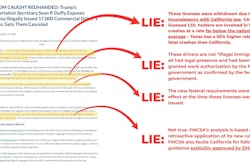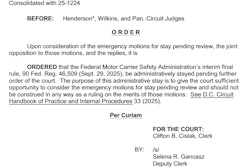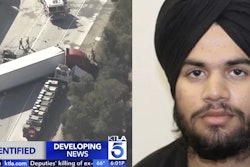Trucking news and briefs for Nov. 13, 2025:
- The bar for ELP compliance "should not be withheld" from truckers: CVSA
- Senate bill would require EPA to authorize prevention of engine shutdowns and power reductions due to emissions control malfunctions in extreme cold.
CVSA pushes unredacted public release of English enforcement guidance
A letter from Commercial Vehicle Safety Alliance Executive Director Collin Mooney to the Federal Motor Carrier Safety Administraiton requested the agency release its newest English Language Proficiency enforcement guidance in unredacted form.
CVSA received that guidance May 20, Mooney noted, and as reported in Overdrive the guidance has been available publicly in partially redacted form since that time. CVSA believes availability of the unredacted version "will improve transparency and better inform the motor carrier community of how to ensure their drivers comply" with ELP requirements, Mooney said. "Releasing the non-redacted version of the enforcement guidance document would have a positive impact on compliance and roadway safety by providing the motor carrier community with the information they need to understand the regulations and how compliance is defined."
For the enforcement community, too, it could be a powerful educational tool in interaction with truckers at roadside and elsewhere, Mooney added.
When FMCSA released the redacted version, which blacks out portions of the driver-interview and highway-sign-recognition sections, the agency cited a Freedom of Information Act exemption that allows agencies to withhold information that "would disclose techniques and procedures for law enforcement investigations or prosecutions, or would disclose guidelines for law enforcement investigations or prosecutions if such disclosure could reasonably be expected to risk circumvention of the law."

[Related: New Mexico releases video of Harjinder Singh passing an inspection in English]
While CVSA's Mooney conceded some law enforcement plans and methods are justifiably concealed, particularly when they include "times or locations of targeted enforcement activities," this routinely enforced rule is different.
"The bar against which compliance will be measured should not be withheld from the motor carrier industry," he said, citing communications from motor carrier CVSA members and others asking for clarity on "how enforcement is evaluating compliance" with ELP regs.
Senate committee aims to prevent dangerous cold-weather diesel derates
The Committee on Environment and Public Works in the United States Senate is reviewing a bill introduced by Sen. Dan Sullivan (R-Alaska) and dubbed the Cold Weather Diesel Reliability Act of 2025. Terms of the legislation, Senate Bill 3135, would require the Environmental Protection Agency (EPA) to authorize manufacturers to suspend engine derates and shutdown functions on diesel vehicles during periods of cold weather.
EPA Administrator Lee Zeldin in August urged engine and equipment manufacturers to revise system software to prevent sudden loss of power from engine derates related to aftertreatment problems. The new legislation, co-sponsored by Cynthia Lummis (Wyoming), however, hones in on arctic temps, at which diesel exhaust fluid (DEF) is known to freeze.
The Senators contend that automatic engine shutdowns and power reductions due to emissions control malfunctions in extreme cold pose "serious, life-threatening risk," and that DEF systems are "frequently unreliable and logistically impractical" in prolonged freezing conditions.
[Related: How truck and engine OEs might approach EPA's new DEF-derate guidance]
The bill does not waive compliance with any emissions standards under the Clean Air Act, yet contends that "emissions safeguards under the Clean Air Act were never intended to jeopardize human safety or impede critical mobility." It would apply to both on- and off-highway diesel vehicles and equipment, and outlines two primary mandates for the EPA, each to be enacted within 180 days of the bill's passage.
Temporary cold weather mitigation. EPA would be required to revise regulations to allow manufacturers to suspend engine derate or shutdown functions. A temporary mode would be allowed when an emissions control fault is triggered at or below freezing (0°C/32°F).
The mode would only be authorized if "continued maximum engine performance ... is necessary to prevent occupational danger, equipment failure, or loss of essential transportation functionality in remote areas," and the diesel engine must return to normal emission control operation once temperatures rise above freezing.
Regional exemption. The bill also grants a year-round exemption from DEF system requirements for specific vehicles -- "primarily operated north of 59 degrees north latitude" or those that encounter operational conditions where prolonged low temperatures make using the DEF system "impractical." The area north of 59 degrees north latitude is primarily Alaska. The bill would exempt those vehicles from any derate or shutdown functions related to the "absence, degradation, malfunction, or fault" of the DEF system.
[Related: Used-truck pricing, long-term value: Emissions-system PM could play increasing role]









